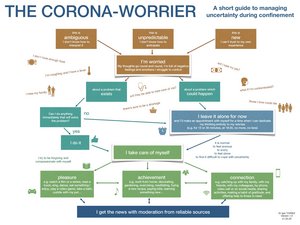 Physical and Mental Well-being in Times of Pandemic and Thesis
Physical and Mental Well-being in Times of Pandemic and Thesis
Containment is not new to doctoral students, as Mathilde Maillard and Mathieu Rouault note. In particular, working on a thesis in the humanities and social sciences involves overwhelming but necessary phases of confinement, involving social isolation and lack of physical activity.
(https://www.grandlabo.com/sos-telethese-continuer-sa-these-en-plein-confinement-coronavirus/)
Whether it is a matter of completing a manuscript or slowing the spread of the pandemic, the repercussions of this condition on physical and mental health are the same: stress, exhaustion, irritability, insomnia, lack of concentration, poor work performance, confusion and guilt. In both cases, stressors may include ignorance about the duration of isolation, uncertainty about the future, or lack of contact (The psychological impact of quarantine and how to reduce it: rapid review of the evidence. S K Brooks, R K Webster, L E Smith, L Woodland, SWessely, N Greenberg, G James Rubin. The Lancet, Vol 395, pages 912–20. March 14, 2020 ; Evans, T., Bira, L., Gastelum, J. et al. Evidence for a mental health crisis in graduate education. Nat Biotechnol 36, 282–284 (2018). https://doi.org/10.1038/nbt.4089).
But isolation can also lead us to carefully and deeply reflect on our ultimate goal, intentions, objectives and value system. Let us remember that the purpose of our current confinement is to help contain the spread of the Covid-19 pandemic: responsibility to the community must be our common goal.
As young researchers, you are (or will be) also called upon to come to the rescue of society, nourishing it with your approaches to knowledge.
Incorporating these considerations into your daily mindset can probably help make sense of the deprivations ...
And what else can be done to counter the negative effects that confinement produces on our physical and mental health?
The visual document below, developed by Igor Thiriez (thanks to Verity Elston of @GradCampusUNIL for the English translation!), offers us some ideas for managing anxiety.
In addition, during these weeks the web is full of advice on good practices to stay in shape and keep our spirits up. Let's make the most of it!
- How to move? On social networks you can find a wealth of tips for your home workouts: for example #homeworkout on Instagram. You can also download applications or join online courses, sometimes for free, sometimes with a donation. Organize your day by including specific times for your training.
- How to keep your morale up? Call or organize a videoconference with your loved ones; list the quiet activities you would do once the lockdown is over; sort out your sources of information and above all, feel proud because you're holding it together!
Remember that hotlines and services are available if you have any questions or need psychological support
UNIFR (https://www3.unifr.ch/home/fr/coronavirus/contacts.html)
UNIGE (https://www.unige.ch/coronavirus/fr/actualite/etudiant-es/)
UNIL (https://www.unil.ch/coronavirus/home.html)
UNINE (https://www.unine.ch/coronavirus/home.html).




 Version française
Version française